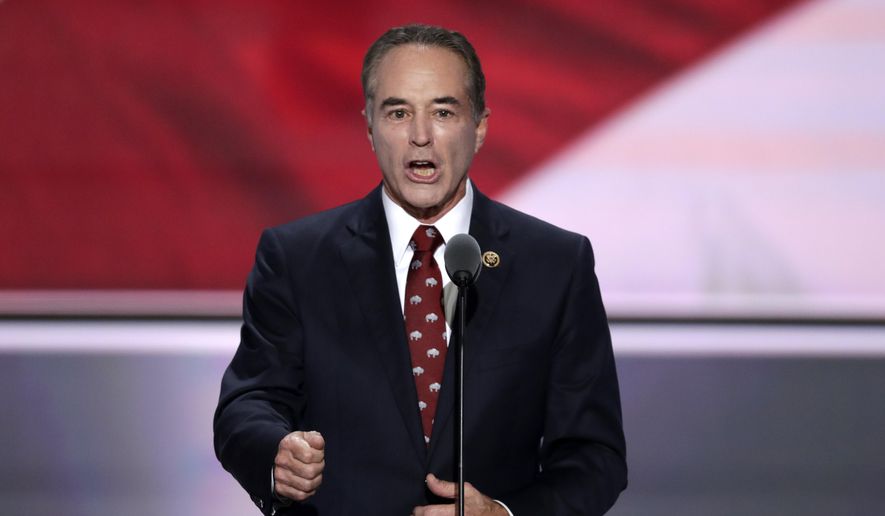Republican leaders are already signaling a compromise on plans to erase a nearly $2 trillion break for state and local taxes, backing down in the face of fierce criticism from Democrats and some blue-state Republicans whose constituents would suffer.
It marks the first retreat on the tax reform framework that Republican leaders released last week, but a compromise could quell the furor among party holdouts whose support will be critical to a final deal.
Known to tax professionals as the SALT deduction, the write-off for “state and local taxes” is a vestige of a century-old federal tax code.
Rep. Chris Collins, New York Republican, said he was encouraged by a dinner Monday evening with House Ways and Means Committee Chairman Kevin Brady, Texas Republican, and about a dozen other members that an accommodation will be made to appease lawmakers from liberal high-tax states fighting to keep the deduction.
“I would say I came away with a very good, optimistic feeling [there’ll] be an accommodation made for the SALT deduction,” he said. “What it finally looks like with caps, either-ors — I firmly believe and certainly the committee understand[s] that we need Republican votes coming out of New York, New Jersey, and California.”
Mr. Collins said they discussed six to 10 ideas, including allowing taxpayers to either take the mortgage interest deduction — which tax-writers also want to preserve — or deduct property taxes paid when they itemize.
Those looking to eliminate the break, which covers state and local income taxes and property taxes, said taxpayers across the country are effectively subsidizing the higher taxes of blue states such as California and Illinois.
But even Republicans supportive of the broader tax reform efforts are nervous about what eliminating the break would mean for their constituents.
The write-off is worth nearly $2 trillion to taxpayers over a decade by some estimates. Nearly all of the approximately 30 percent of taxpayers who itemize their deductions took advantage of the break in 2014, according to the Tax Foundation.
Rep. Tom Reed, a New York Republican who sits on the tax-writing Ways and Means Committee, expressed optimism Tuesday that there would be some kind of solution while saying the status quo isn’t sustainable.
He said tax-writers could design a credit that targets working-class families rather than the rich.
“I’m very confident that the voice of those that we represent when it comes to those hardworking families in particular is heard by us here in the process,” Mr. Reed said. “I’m confident at the end of the day they’re going to be taken care of.”
Rep. Andy Barr, Kentucky Republican, also said one compromise could be to means-test the provision and preserve the break for middle-income taxpayers.
“But if you’re a high-income person living in Greenwich, Connecticut, you lose it,” Mr. Barr said at a Tuesday event hosted by The Heritage Foundation.
As part of the deal, lawmakers would squash the idea of a fourth, higher individual tax rate in the Republican framework, he said.
Senate Finance Committee Chairman Orrin G. Hatch, Utah Republican and the upper chamber’s top tax-writer, has also said in recent days that he would like to preserve the state and local deduction if possible.
White House economic adviser Gary Cohn said last week that the deduction isn’t a “red line” in the tax talks.
Senate Minority Leader Charles E. Schumer, New York Democrat, said on CBS this week that the proposal to ax the state and local deduction was the first “Achilles’ heel” of the Republican tax plan.
Giving up on eliminating the deduction, though, would blow a giant hole in the plan, either forcing Republicans to accept massive deficits or trim back plans to lower tax rates elsewhere.
They already have axed plans for a trillion-dollar border tax and have been hesitant to identify other specific breaks and loopholes they intend to close, leaving the state and local deduction as one remaining major potential revenue-raiser.
Sen. Bob Corker, Tennessee Republican, said the state and local deduction is the easiest tax preference to eliminate but that he is already hearing “softness” on it.
“I’m actually interested to see if Congress has the intestinal fortitude to close $4 trillion in loopholes,” said Mr. Corker, referring to the target figure for offsets he said the administration has laid out.
Part of the reason the deduction is so difficult to weed out of the code is its longevity.
It has been around at least since the start of the federal income tax system in 1913, when state and local levies were the primary forms of taxation.
Jared Walczak, a senior policy analyst at the Tax Foundation, said there was a danger in the early years that with a top federal rate of 90 percent, combined with local taxes, wealthy individuals could end up owing their entire paychecks to the government.
“Certainly, people have become far more acclimated to the idea that the federal government does, in fact, impose direct taxes on individuals, and the change in those top rates — those are reasons why it had early adoption staying power and both of those have changed dramatically,” he said.
A similar debate over whether to get rid of the break played out during the tax reform push in 1986.
Then-Ways and Means Committee Chairman Dan Rostenkowski ultimately concluded that the reform effort would stumble unless he kept the deduction. The Reagan administration wanted to ax it to pay for lowering other rates, said Jeffrey Birnbaum, a former journalist who chronicled the 1980s tax reform fight in the book “Showdown at Gucci Gulch.”
“Tax reform would have failed in the Ways and Means committee had he not decided to keep the deduction,” Mr. Birnbaum said.
There still ultimately was a compromise. The final 1986 package repealed the deductibility of states’ and localities’ sales taxes but kept it for their property and income taxes.
• David Sherfinski can be reached at dsherfinski@washingtontimes.com.




Please read our comment policy before commenting.